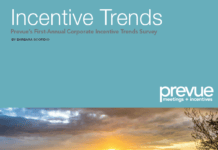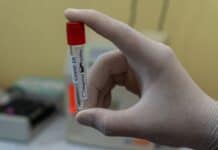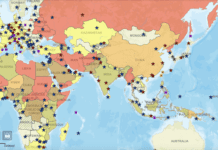When it comes to COVID-19 and events, meeting and event organizers can take heart from a recent announcement from Anthony Fauci, MD, Director of the National Institute of Allergy and Infectious Diseases, that we’re heading out of the full-blown pandemic phase of COVID-19. However, even as states relax mask and vaccine requirements, experts say it’s still important to mitigate COVID risks, especially for events that draw an international crowd.
The latest pandemic stats are good news for meeting and event organizers: The number of new cases of COVID-19 in the U.S. have declined by 63% over the past two weeks, and hospitalizations also are down 28%. In fact, things are looking so good that states from Massachusetts to California have announced plans to lift their mask and vaccine mandates in the near future as vaccination rates rise, new treatments are approved and more people gain natural immunity from prior infections.
As Anthony Fauci, MD, Director of the National Institute of Allergy and Infectious Diseases, told the Financial Times about the outlook for state and federal COVID-related regulation, “As we get out of the full-blown pandemic phase of COVID-19, which we are certainly heading out of, these decisions will increasingly be made on a local level rather than centrally decided or mandated. There will also be more people making their own decisions on how they want to deal with the virus.”
Among those making their own decisions are going to be meeting and event organizers.
Even as indications point toward COVID-19 becoming an endemic disease, much like the seasonal flu, we’re not quite out of the woods just yet. Deaths, which tend to lag behind infections and hospitalizations, are still at a year-long high. One of Omicron’s subvariants, BA.2, which is estimated to be 1.5 times more virulent than the BA.1 subvariant that has been hitting the U.S. hard in recent months, has become predominant in parts of Europe, Hong Kong and elsewhere around the globe, causing spikes in infection rates.

This means that meeting and event organizers, particularly those that have attendees and exhibitors coming from outside the U.S., still need a strategy to help mitigate COVID-related risk, says Anthony Harris, MD, MBA, MPH, CEO of Hfit Health. But don’t worry, you don’t need to reinvent the wheel, he adds. “The strategy you need now is very similar to what you have had since the beginning of the pandemic.” Here are Harris’ recommendations for holding events at this point in the pandemic:
- Require proof of full vaccination for in-person attendees, exhibitors, staff and contractors. Continue to provide a digital component for those who, for whatever reason, can’t provide that proof of vaccination. All who attend in person should, however, be fully vaccinated, which Harris defines as having had two shots of the Pfizer or Moderna mRNA vaccines, or one shot of Johnson & Johnson — soon likely two shots of the Johnson & Johnson vaccine.
What about boosters? If people are going to be in close proximity, as they likely will be at a meeting, “it would be prudent to include boosters to fulfill the requirement to be what the CDC and the clinical community calls ‘up to date,’” he says. “We’re seeing that getting a third dose of mRNA can reduce your risk for symptomatic illness, and it certainly reduces dramatically your risk for severe illness and/or hospitalization. So as we move forward and have more and more Americans boosted, I think including boosters will grow among the requirements of those hosting events nationwide.”
- Require masks, even if your meeting is in a jurisdiction where mask mandates are no longer in play. “In my opinion, it is prudent to require masks, especially if people are coming from abroad where there may be different levels of transmission risk,” says Harris. “Keeping everyone safe is obviously the top priority, and masks are an easy-to-apply barrier that is very effective at reducing transmissions, especially at indoor conferences.” The recommendation now is that people wear N95 or KN95 masks, or a surgical mask if other types aren’t available. “Cloth masks have been shown to have limited effectiveness, so that may be a trend that is past,” says Harris.
- Hold events outdoors when possible. Especially social and networking events where people will be removing masks to eat and drink, holding the event outdoors allows attendees to experience the camaraderie without having to mask up.
- Continue to maintain social distancing and good hand hygiene, and ensure the venue has appropriate air filtration. “It is prudent to make sure that your venue has the appropriate air filtration measures in place: Does its HVAC system have HEPA filters? How often is the air being exchanged? The recommended rate is six times per hour or greater,” he says. Also, ask if the venue is sanitizing surfaces using electrostatic sanitization and UV light.
- Offer on-site COVID testing. “We’ve been advising that event organizers provide COVID tests on-site, but also are putting boots on the ground here in Chicago for events my practice works with,” Harris says. Even if people are not symptomatic, it helps to mitigate any new transmissions to test anyone who has a known exposure to COVID, he adds. “It also helps with your travelers that need a PCR or rapid test to get back to their respective countries of origin. Even just a small operation where people can get tested is not just a convenience, but will both mitigate risk and provide peace of mind for those who need a test to travel to their home country.”
- Advise attendees who plan to stay with friends or family, instead of at a host hotel, to have those friends and family test themselves prior to the attendee’s arrival. “We know the predominance of transmission occurs in the household, which increases the risk compared to someone who’s staying in a hotel,” Harris says.
You Might Also Be Interested In
New Study Reveals Changing Meetings Landscape











